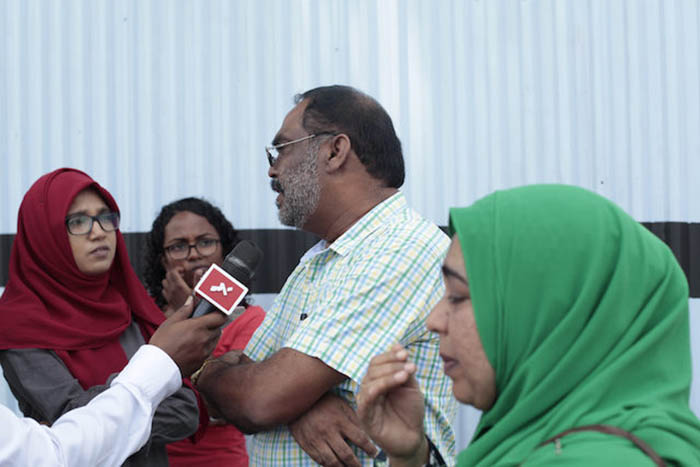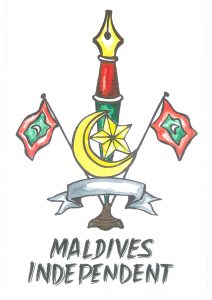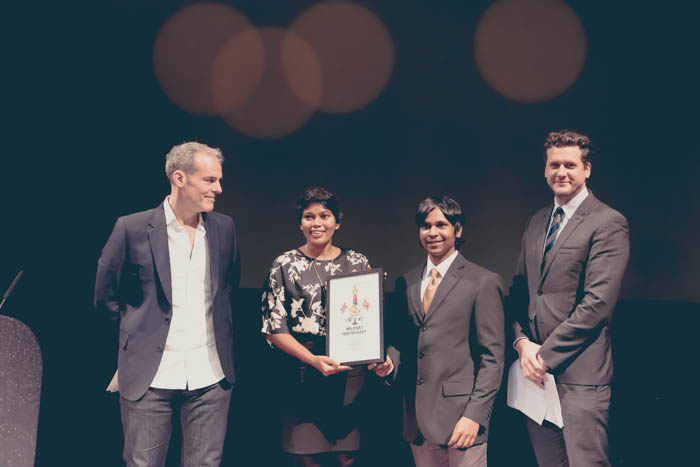Index relies entirely on the support of donors and readers to do its work.
Help us keep amplifying censored voices today.
[vc_row][vc_column][vc_column_text]

Yameen Rasheed’s family submit a petition to Maldives Police Services to investigate his murder.
Your Excellency,
The undersigned civil society organisations write to you to condemn in the strongest terms the murder of internationally recognised Maldivian blogger Yameen Rasheed. We call on the government to take all necessary measures to ensure that the perpetrators of this heinous crime are brought to justice and to end the cycle of impunity for attacks on journalists, bloggers, and human rights defenders that has taken root in the Maldives.
Yameen Rasheed was an impassioned critic who reported on issues related to corruption, radicalism, and impunity, mainly through his popular blog The Daily Panic. In 2015, IFEX helped to support Yameen to speak out on these issues at the UN Human Rights Council in Geneva. His witty and relentless condemnation of systemic injustice earned him praise but also drew the attention of religious extremists and government officials who felt threatened by his social and political commentary.
Yameen Rasheed had reported numerous death threats before his attack. The police refused to act on any of his complaints. Reports since his killing suggest that the crime scene had been tampered with before a thorough review of evidence could be carried out. Furthermore, the family of Yameen Rasheed has reported harassment by local police who sought to prevent them from making public calls for justice for the death of their son. Such troubling reports raise doubts about the authorities’ commitment to ensure that a proper investigation takes place.
Yameen’s case is emblematic of the growing intolerance for ideas and opinions that challenge the role of religion in society throughout South Asia. Similar to countries like Pakistan and Bangladesh, in the Maldives, harassment of individuals that promote moderate or secular views has been common, and is justified by both militant criminal groups and sympathetic politicians on the grounds that these ideas are “un-Islamic.”
Yameen is one of three recent high-profile cases of attacks on media personnel in the Maldives over the past five years. In 2012 Ismail Rasheed, a freelance journalist and human rights campaigner, barely survived after having his throat slit near his home in the Maldivian capital, Malé. In 2014, Ahmed Rilwan, journalist for Minivan News, was abducted from his office and remains missing to this day. Rilwan was a close friend of Yameen’s, and much of Yameen’s work was focused on finding justice for Rilwan’s abduction. In all cases there has been a lack of adequate police investigation and response.
There are further causes for concern in the broader Maldivian free expression environment. The country ranks 117th out of 180 countries in Reporters Without Borders’ 2017 Press Freedom Index, due in large part because of restrictive laws such as the 2016 “Protection of Reputation and Good Name and Freedom of Expression Bill”, which criminalises defamation based on an overly broad definition of the offence. Public threats have frequently been issued against independent media by politicians, criminal gangs and religious extremists and have helped to create a climate of hostility that has led to self-censorship. Imprisonment of journalists and activists is also a common tactic used to silence critical voices.
Yameen Rasheed’s death should serve as a strong indicator of the need for immediate steps to protect space for dissent and debate in the Maldives, space that is threatened by draconian laws and impunity for attacks committed against individuals expressing controversial or adversarial opinions. As such, we call on the government to take the following measures:
• Ensure that a timely, thorough, and transparent investigation into the killing of Yameen Rasheed takes place and all perpetrators of this crime against freedom of expression are brought to justice. Similar action should be taken in the cases of Ismail Rasheed and Ahmed Rilwan;
• Investigate and hold accountable all those who make threats or incite violence against journalists, bloggers, and human rights defenders, as well as against the family of Yameen Rasheed;
• Amend or repeal laws that create disproportionate and unnecessary limits to legitimate expression, according to standards specified in Article 19 of the International Covenant on Civil and Political Rights, ratified by the Maldives in 2006;
• Implement legislation and other measures to create a safe and enabling environment for journalists and human rights defenders, according to relevant recommendations accepted by the Maldives during its 2nd cycle Universal Periodic Review (UPR);
• Improve independence of the judiciary and build technical capacity of the police force through international assistance and other reforms, as agreed to by the Maldives during its 2nd cycle UPR.
Signed,
Bytes for All
Adil Soz – International Foundation for Protection of Freedom of Speech
Afghanistan Journalists Center
ARTICLE 19
Association for Media Development in South Sudan
Bahrain Center for Human Rights
Cambodian Center for Human Rights
Canadian Journalists for Free Expression
Center for Media Freedom and Responsibility
Committee to Protect Journalists
Foundation for Press Freedom – FLIP
Freedom Forum
Free Media Movement
Global Voices Advox
Globe International Center
Human Rights Network for Journalists – Uganda
Index on Censorship
Institute of Mass Information
International Federation of Journalists
International Press Centre
International Publishers Association
MARCH
Media, Entertainment and Arts Alliance
Media Institute of Southern Africa
Pakistan Press Foundation
Palestinian Center for Development and Media Freedoms – MADA
PEN American Center
PEN Canada
PEN International
Reporters Without Borders
Vigilance pour la Démocratie et l’État Civique
Asian Forum for Human Rights and Development
Awaz Foundation Pakistan, Centre for Development Services
Banglar Manabadhikar Suraksha Mancha
Bangladesh Manobadhikar Sangbadik Forum
Center for Social Activism
Center for Media Research – Nepal
Commonwealth Human Rights Initiative
FIDH, in the framework of the Observatory for the Protection of Human Rights Defenders
Front Line Defenders
Free Press Unlimited
Maldivian Democracy Network
Peoples’ Vigilance Committee on Human Rights
People’s Watch India
Pakistan NGOs Forum
Programme Against Custodial Torture and Impunity
South Asian Women in Media – Sri Lanka
South India Cell for Human Rights Education and Monitoring
World Organisation Against Torture (OMCT), in the framework of the Observatory for the Protection of Human Rights Defenders[/vc_column_text][/vc_column][/vc_row][vc_row][vc_column][vc_basic_grid post_type=”post” max_items=”4″ element_width=”6″ grid_id=”vc_gid:1494603115837-be75a009-7c8a-9″ taxonomies=”9143, 4002, 8875, 9028″][/vc_column][/vc_row]
[vc_row][vc_column][vc_column_text]Index on Censorship strongly condemns the killing of Maldives blogger Yameen Rasheed, who was found with multiple stab wounds in the stairway of his apartment building in Malé on Sunday 23 April 2017, and died soon after he was taken to the hospital.
“We call on Maldives authorities to conduct a thorough and impartial investigation into the murder of Yameen Rasheed,” Index’s head of advocacy Melody Patry said. “The failure to protect Rasheed after he reported receiving multiple death threats to the police is tragic. It is critical the police show credible and independent efforts to bring those responsible to justice.”
Rasheed was 29 years old and frequently satirised the Maldives’ political and religious authorities in his blog the Daily Panic. Zaheena Rasheed, friend and editor of the Maldives Independent news website said Yameen Rasheed had reported receiving multiple death threats to the police. He was also a close friend of Ahmed Rilwan, the Maldives Independent journalist who was abducted and disappeared in 2014.
This killing takes place the same week editors of Maldives Independent received the 2017 Index on Censorship Freedom of Expression Journalism Award. During her acceptance speech, exiled editor Zaheena Rasheed said “the space for independent press was narrowing by the day”.
Maldives journalists and bloggers have faced increased pressure and taken great risks to express their opinion and hold the government to account. In August 2016 the Maldives passed a law criminalising defamation and empowering the state to impose heavy fines and shut down media outlets for “defamatory” content. In September, Maldives Independent’s office was violently attacked and later raided by the police, after the release of an Al Jazeera documentary exposing government corruption. [/vc_column_text][/vc_column][/vc_row][vc_row][vc_column][vc_basic_grid post_type=”post” max_items=”12″ style=”load-more” items_per_page=”4″ element_width=”6″ grid_id=”vc_gid:1492962363297-360949b6-0f99-2″ taxonomies=”4002″][/vc_column][/vc_row]
[vc_row][vc_column][vc_column_text]
Website Maldives Independent, which provides news in English, is one of the few remaining independent media outlets in a country that ranks 112 out of 180 countries on the Reporters Without Borders Press Freedom Index. In August 2016 the Maldives passed a law criminalising defamation and empowering the state to impose heavy fines and shut down media outlets for “defamatory” content. In September, Maldives Independent’s office was violently attacked and later raided by the police, after the release of an Al Jazeera documentary exposing government corruption that contained interviews with editor Zaheena Rasheed, who had to flee for her safety. Despite the pressure, the outlet continues to hold the government to account.
Thank you very much for this great honour.
We are so humbled and pleased to be here in London with you and very excited about the coming year as Index fellows.

2017 Freedom of Expression Journalism Award-winning Maldives Independent was presented an illustration created by cartoonist Aseem Trivedi.
The day I received Index’s award email was one of my worst days as editor of the Maldives Independent. That was in January – I had already been living in exile for more than six months. Team morale was low: All of us had been arrested and some of us had received death threats. We had faced a police raid on our office. A member of our team, Ahmed Rilwan, had been abducted and disappeared. The space for independent press was narrowing by the day, but public apathy appeared to be growing. We questioned if we were making an impact. And, to make matters worse, there were questions about continued funding for the website. The odds suddenly felt too great to overcome.
And then, we received Index on Censorship’s email.
This award feels like a lifeline.
Most of our challenges remain the same, but this recognition and the fellowship has renewed and strengthened our resolve to continue reporting, especially on the bleakest of days. Most importantly, we no longer feel so alone.
Tonight I want to honour my colleague, Ahmed Rilwan – who embodies the spirit of speaking truth to power, even in the face of the gravest threats. He’s been missing for nearly 1,000 days now. I want to say tonight, that no matter how long it may take, we will continue the search for him and fight for him.
Thank you again to Index on Censorship.
A big thank you to our former editors, for the support and mentorship, and to the Maldives Independent’s brave team, Naish, Hassan, Jundu, Petu, Saya, Shaff and Thy, for your fearless reporting, and to my fellow journalists in the Maldives, for the solidarity. Thank you.

SAGE Publishing’s Ziyad Marar, 2017 Freedom of Expression Award Journalism Fellow Zaheena Rasheed, Maldives Independent’s Ahmed Naish, CNN London bureau chief Tommy Evans (Photo: Elina Kansikas for Index on Censorship)
[/vc_column_text][/vc_column][/vc_row][vc_row][vc_column width=”1/2″][vc_single_image image=”84882″ img_size=”full” alignment=”center”][vc_column_text]
For his one-man protests, Ildar Dadin was sent to prison in December 2015 where he was tortured, before his conviction was quashed in February 2017. Read the full profile.[/vc_column_text][/vc_column][vc_column width=”1/2″][vc_single_image image=”84888″ img_size=”full” alignment=”center”][vc_column_text]
Despite the persecution he faces for his work, Rebel Pepper continues to satirise the Chinese state from a life in exile in Japan. Read the full profile
[/vc_column_text][/vc_column][/vc_row][vc_row][vc_column width=”1/2″][vc_single_image image=”84889″ img_size=”full” alignment=”center”][vc_column_text]
Established in 2015, Turkey Blocks is an independent digital research organisation that monitors internet access restrictions in Turkey. Read the full profile.
[/vc_column_text][/vc_column][vc_column width=”1/2″][vc_single_image image=”84887″ img_size=”full” alignment=”center”][vc_column_text]
Maldives Independent, the Maldives’ premiere English publication and one of the few remaining independent media outlets, was formed in exile in Sri Lanka in 2004. Read the full profile.
[/vc_column_text][/vc_column][/vc_row][vc_row][vc_column][vc_basic_grid post_type=”post” max_items=”12″ style=”load-more” items_per_page=”4″ element_width=”6″ grid_id=”vc_gid:1492790324751-cc80d0b8-3169-3″ taxonomies=”8935″][/vc_column][/vc_row]
[vc_row][vc_column][vc_custom_heading text=”Contributors include Richard Sambrook, Dominic Grieve, Roger Law, Karim Miské, Mark Frary and Canan Coşkun”][vc_row_inner][vc_column_inner width=”1/2″][vc_column_text]
[/vc_column_text][/vc_column_inner][vc_column_inner width=”1/2″][vc_single_image image=”88802″ img_size=”full”][/vc_column_inner][/vc_row_inner][vc_column_text]
[/vc_column_text][/vc_column][/vc_row][vc_row][vc_column][vc_custom_heading text=”SPECIAL REPORT: THE BIG SQUEEZE” css=”.vc_custom_1481731933773{margin-right: 0px !important;margin-left: 0px !important;border-bottom-width: 1px !important;padding-top: 15px !important;padding-bottom: 15px !important;border-bottom-color: #455560 !important;border-bottom-style: solid !important;}”][vc_column_text]
[/vc_column_text][/vc_column][/vc_row][vc_row][vc_column][vc_custom_heading text=”IN FOCUS” css=”.vc_custom_1481731813613{margin-right: 0px !important;margin-left: 0px !important;border-bottom-width: 1px !important;padding-top: 15px !important;padding-bottom: 15px !important;border-bottom-color: #455560 !important;border-bottom-style: solid !important;}”][vc_column_text]
[/vc_column_text][/vc_column][/vc_row][vc_row][vc_column][vc_custom_heading text=”CULTURE” css=”.vc_custom_1481731777861{margin-right: 0px !important;margin-left: 0px !important;border-bottom-width: 1px !important;padding-top: 15px !important;padding-bottom: 15px !important;border-bottom-color: #455560 !important;border-bottom-style: solid !important;}”][vc_column_text]
[/vc_column_text][/vc_column][/vc_row][vc_row][vc_column][vc_custom_heading text=”COLUMNS” css=”.vc_custom_1481732124093{margin-right: 0px !important;margin-left: 0px !important;border-bottom-width: 1px !important;padding-top: 15px !important;padding-bottom: 15px !important;border-bottom-color: #455560 !important;border-bottom-style: solid !important;}”][vc_column_text]
[/vc_column_text][/vc_column][/vc_row][vc_row][vc_column][vc_custom_heading text=”END NOTE” css=”.vc_custom_1481880278935{margin-right: 0px !important;margin-left: 0px !important;border-bottom-width: 1px !important;padding-top: 15px !important;padding-bottom: 15px !important;border-bottom-color: #455560 !important;border-bottom-style: solid !important;}”][vc_column_text]
[/vc_column_text][/vc_column][/vc_row][vc_row][vc_column][vc_custom_heading text=”SUBSCRIBE” css=”.vc_custom_1481736449684{margin-right: 0px !important;margin-left: 0px !important;border-bottom-width: 1px !important;padding-bottom: 15px !important;border-bottom-color: #455560 !important;border-bottom-style: solid !important;}”][vc_column_text]Index on Censorship magazine was started in 1972 and remains the only global magazine dedicated to free expression. Past contributors include Samuel Beckett, Gabriel García Marquéz, Nadine Gordimer, Arthur Miller, Salman Rushdie, Margaret Atwood, and many more.[/vc_column_text][vc_row_inner][vc_column_inner width=”1/2″][vc_single_image image=”76572″ img_size=”full”][/vc_column_inner][vc_column_inner width=”1/2″][vc_column_text]In print or online. Order a print edition here or take out a digital subscription via Exact Editions.
Copies are also available at the BFI, the Serpentine Gallery, MagCulture, (London), News from Nowhere (Liverpool), Home (Manchester), Calton Books (Glasgow) and on Amazon. Each magazine sale helps Index on Censorship continue its fight for free expression worldwide.
![]() SUBSCRIBE NOW[/vc_column_text][/vc_column_inner][/vc_row_inner][/vc_column][/vc_row]
SUBSCRIBE NOW[/vc_column_text][/vc_column_inner][/vc_row_inner][/vc_column][/vc_row]